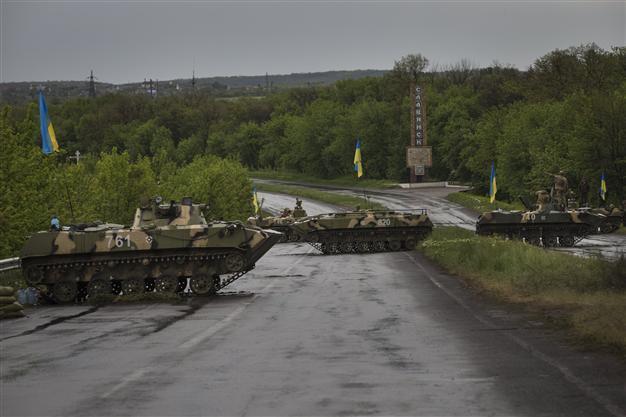Ukraine hosts roundtable talks after bloody day for military
KIEV - Agence France-Presse

Armored vehicles parked at a Ukrainian army checkpoint on the main road between Kramatorsk and Slovyansk, 10 kilometers south of Slovyansk, Ukraine, Thursday, May 8, 2014. AP Photo
Ukraine is hosting roundtable "national unity" talks on Wednesday after its military suffered its bloodiest day since launching an offensive to oust separatist pro-Moscow rebels in the east.
Insurgents killed seven Ukrainian soldiers in an ambush and firefight near the rebel-held eastern town of Kramatorsk on Tuesday, underscoring the urgency of a new diplomatic push by Europe to resolve the escalating crisis on its doorstep.
European leaders have called for Wednesday's talks in Kiev, being held under a roadmap drafted by the pan-European security body the OSCE, to be as inclusive as possible.
The meeting, due to start at 1330 GMT, will bring together government officials including Prime Minister Arseniy Yatsenyuk as well as lawmakers, and former leaders and candidates running in this month's crunch presidential election.
But separatist rebels who have overrun more than a dozen towns in the east since early April will not be sitting at the table.
"The Ukrainian leadership is open for an inclusive national unity dialogue," a Ukrainian foreign ministry spokesman said.
"However, it is impossible to engage terrorists, whose objective is to destroy not only national unity but Ukrainian statehood," the spokesman said in a statement Wednesday.
He accused Russia of playing a "dirty game" with a "biased" interpretation of the OSCE roadmap, and demanded that Moscow pull back its troops from the border.
German Chancellor Angela Merkel nevertheless said the talks offered a "good possibility" of finding a way out of the worst crisis between Moscow and the West since the Cold War.
"The more representative the roundtables are, the better that is," she said on Tuesday, but added that there was no place for those who support violence.
Her comments came a day after her Foreign Minister Frank-Walter Steinmeier was in Ukraine to push Kiev and pro-Moscow rebels to come together at the negotiating table ahead of the May 25 presidential election.
Wednesday's roundtable discussions, to be moderated by veteran German diplomat Wolfgang Ischinger, "are of course only a start", Steinmeier conceded.
EU leaders ramped up the pressure on Russia with new sanctions on Monday, and warned of further "far-reaching" punitive measures if the election fails.
But while voicing support for the OSCE plan, Russia has accused Ukraine's pro-West authorities of refusing "real dialogue" with the separatists.
It is demanding that Kiev halt its military operation in the east if rebels are to comply with the peace initiative, and insists that negotiations on regional rights must take place before the presidential vote.
Concerns over Ukraine's very future have been heightened following weekend votes for independence in the eastern industrial provinces of Donetsk and Lugansk.
The referendums were rejected as illegal by Kiev and the West, fearful that Russian President Vladimir Putin would move quickly to annex the territories as he did with Crimea in March, despite Western outrage.
And Donetsk governor Serhiy Taruta said Tuesday the referendums were nothing more than a "social survey".
"As for the Donetsk People's Republic, such a republic does not exist legally or politically," he said. "There is only a dreamed-up name and nothing else."
Moscow however said it "respects" the votes and called for talks with rebels in the industrial regions, home to seven million of Ukraine's 46 million people.
Putin said last week that Russia had withdrawn its estimated 40,000 troops from the border with its western neighbour, but the West says it has seen no sign of a major pullback.
Poland's Prime Minister Donald Tusk pressed for urgent NATO and EU action, warning that the country's fate could be decided in the next few days or weeks.
He said Tuesday there was a "real risk or threat that the Ukrainian state could fall, or at least be subject to a very painful split".
The Organisation for Security and Cooperation in Europe, which began life as a forum for East-West dialogue in the Cold War, is now playing a key role in trying to defuse the crisis with a roadmap calling for "restraint from violence, disarmament, national dialogue, and elections".
Violence has raged for weeks in eastern Ukraine as government troops carry out what it describes as "anti-terrorist" operations against well-armed rebels who seized cities and towns in the chaotic aftermath of the ouster of Ukraine's pro-Russian leader Viktor Yanukovych in February.
And on Tuesday, the Ukrainian military suffered its bloodiest single day since the separatist insurrection in the east, with seven troops killed in an ambush between the insurgent strongholds of Slavyansk and nearby Kramatorsk.
Also Tuesday, rebels in Lugansk claimed their self-styled governor Valery Bolotov survived an "assassination attempt" after assailants opened fire on his car with automatic rifles.
The Kremlin said Kiev had to immediately stop "reprisal raids" in the east -- using a term that refers to a World War II-era Nazi massacre -- and pull back troops from the encircled cities and towns.
But interim President Oleksandr Turchynov has insisted that the offensive, which has triggering fighting that has left dozens dead in the east and in an inferno in the southern port city of Odessa, would continue.
The deepening crisis in the former Soviet republic has also stoked European concerns about the vital supply of Russian gas, much of which flows through Ukraine.
Yatsenyuk, in Brussels to seek EU support for his beleaguered government, accused Russia of "stealing" Ukraine's gas and threatened to take Russia to the international arbitration court if it rejected proposals to settle their dispute over gas contracts and prices.
Russia has threatened to cut supplies from June 3 if the economically struggling Ukraine does not settle a $1.66 billion bill.
